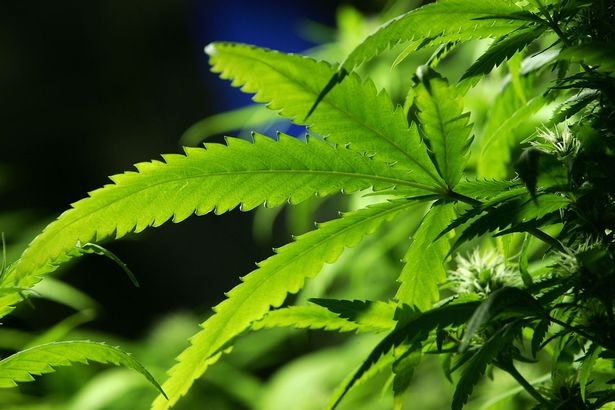
Cannabis is a plant and a class B drug. It affects people differently. It can make you feel relaxed and chilled but it can also make you feel sick, affect your memory and make you feel lethargic.
Cannabinoids – what are they?
Cannabinoids are compounds that can interact with a system inside the body known as the endocannabinoid system.
Most commonly, the term “cannabinoid” is used to refer to the compounds found in cannabis (and other plants). As the body naturally produces cannabinoids itself (known as endocannabinoids), a more accurate term for these is phytocannabinoids (meaning “cannabinoids from plants”).
Researchers have found that cannabis contains over 450 different chemical compounds, many of which are cannabinoids.
The two main cannabinoids of interest to researchers are:
Different types of cannabis have differing amounts of these and other chemicals in them. This means they can have different effects on the body.
How do cannabinoids work inside the body?
Our bodies naturally produce our own cannabinoids (known as endocannabinoids).
These interact with molecules found on the surface of cells (cannabinoid receptors). One type of is densely packed inside the brain and second type is found in our immune tissues.
These compounds and receptors form the endocannabinoid system, a network that is involved in the control and regulation of multiple functions within the body – including memory, sleep, learning, eating, pain control, inflammation, and immune system.
As THC, CBD and other cannabinoids look similar to the endocannabinoids inside the body, they are able to interact with these receptors and affect how the system functions.
This is why some researchers think that cannabinoids have the potential to control some of the most common and debilitating symptoms of cancer and its treatments, including nausea and vomiting, loss of appetite, and pain.
In the UK, medical use of cannabis was legalised in November 2018 and the UK is one of the world’s largest exporters of legal cannabis. However, cannabis is still classified as a class B drug in the UK, meaning that it is illegal to possess or supply it for personal recreational use.
Cannabis Oil, CBD Oil, and Hemp Oil – What’s the difference?
There are different types of oil made from parts of the marijuana plant. Some are sold legally in health food stores as a food supplement. Other types of oil are illegal.
CBD Oil is not the same as Cannabis Oil. Although both are derived from the same species of plant (Cannabis sativa), CBD oil and cannabis oil are different, and also fall under completely different laws. Moreover, CBD oil and cannabis oil are usually consumed for different purposes.
CBD Oil
CBD oil often features all (or most) of these cannabinoids, minus copious amounts of THC. Some CBD oils contain trace amounts of THC, but not nearly enough to have a psychotropic effect. Some CBD oils also contain hemp seed oil or olive oil carriers added to increase bioavailability (rate and efficacy of the formula) and for added flavour.
As these already minuscule amounts are further reduced during the production of CBD oils, there is essentially no THC in these products at all (hence the term ‘trace’).
However, among consumers in the know, full-spectrum CBD oils are becoming more popular as we learn more about the potential of, and health benefits, associated with these so-called “whole-plant” formulas.
Given the difference in cannabinoid profile, people often favour cannabis oil because its effects differ from CBD oil.
CBD oil is most often made from industrial hemp. Hemp isn’t a different species than recreational cannabis, but it does feature one very significant difference: negligible amounts of the psychotropic constituent THC. Hemp does, however, contain CBD and other cannabinoids such as CBDA, CBC, CBGA, CBN, and CBCA. CBD oil often features all (or most) of these cannabinoids, minus copious amounts of THC. Some CBD oils also have hemp seed oil or olive oil carriers added to increase bioavailability (rate and efficacy of the formula) and flavour.
Throughout much of Europe, hemp must contain no more than 0.2% THC to be considered legal. This threshold is increased slightly in the US at 0.3% THC. CBD oils made from hemp cannot get you high. Because of this, CBD oil is legally available throughout the EU and in other nations.

Discount Cannabis Seeds > CBD Products
Full Spectrum CBD Oil vs CBD Isolate
When you’re shopping for CBD oil, you may come across the phrase “full spectrum” oil or “CBD isolate”. What do these terms mean?
Full spectrum CBD oil
Full spectrum CBD oil doesn’t contain just CBD, but also other cannabinoids like CBN, CBDV, CBG, CBC, and CBDA. It also contains flavonoids and terpenes, the substances that give cannabis its flavour and colour.
It is believed that these “minor” cannabinoids and other substances work in synergy to support a phenomenon known as the “entourage effect”. In essence, the active chemical constituents in hemp can work together to produce an effect that’s greater than the sum of its parts. As a result, full spectrum oils have become popular among those looking to benefit from the entourage effect.
CBD isolate
CBD isolate, on the other hand, doesn’t contain any other cannabinoids, flavonoids, or terpenes, as it is an almost pure form (99.9%) of CBD.
CBD isolate has the advantage of being the purest form of CBD. There is no risk of psychotropic effects, and a drug test won’t show anything. CBD isolate is also tasteless and odourless, which can make it more suitable for adding to recipes. However, among consumers in the know, full spectrum CBD oils tend to be more popular as we learn more about the potential of these so-called “whole plant” formulas.
Cannabis and Hemp plants contain both CBD and THC along with more than 540 other substances. The main difference between the two plants is the amount of each compound they contain.
Marijuana contains more THC, and less CBD. Hemp contains more CBD and less THC.
Most importantly, the benefits of CBD do not change whether it is cannabis-derived CBD or hemp-derived CBD. Common side effects, such as an upset stomach, feeling tired, or feeling on edge, remain the same. This is because the chemical make-up of CBD does not depend on which plant it comes from.
However, the amount of CBD available for extraction does depend on the source. Hemp plants contain far more CBD, making them the more lucrative option for manufacturers and the option with the least potential legal ramifications.
Cannabis oil can cure cancer?
A post on Facebook, shared hundreds of times, claims that a “60 gram supply of Cannabis Oil” is “enough to treat one cancer patient”. It also includes an image of several plastic syringes which it claims contain cannabis oil, with the caption “Cancer Cure”.
While there is evidence some cannabis products can be beneficial to cancer patients, and research on this is ongoing, there is no current proof that cannabis oil can cure cancer.
Claims that cannabis products can cure cancer are ‘misleading’.
The Facebook post doesn’t provide any source for its claim that 60g of cannabis oil would be enough to treat one cancer patient, nor does it include any specific information about what types or stages of cancer could allegedly be treated with cannabis oil.
Cancer Research UK, which describes itself as “supportive of properly conducted scientific research into cannabis and its derivatives that could benefit cancer patients”, says: “The current consensus is that, right now, there isn’t a large enough body of evidence to prove that cannabis (or any of its active compounds or derivatives) can reliably treat any form of cancer but the medical use of cannabis to treat cancer-related chronic pain is approved in the UK.”
It also says: “Claims that there is solid ‘proof’ that cannabis or cannabinoids can cure cancer are highly misleading.”
Professor Edzard Ernst, emeritus professor at the University of Exeter stated “Cannabinoids have been shown to reduce the size of prostate cancers in animal models. Isolated case reports have yielded encouraging findings also in human cancers, for instance, acute lymphoblastic leukaemia.
However, case reports cannot be considered reliable evidence, and there is currently no data from rigorous clinical trials to suggest that cannabis products will alter the natural history of any cancer.”
While cannabis products are not a proven cure for cancer, Cancer Research UK does state that there is “good evidence that cannabinoids may be beneficial in managing cancer pain and side effects from treatment”.
Macmillan Cancer Support says research has shown that cannabinoids can cause a cell to die, stop cells from dividing and stop cells from developing blood vessels. However, research has also shown that cannabinoids can damage important blood vessels, encourage cancer cells to grow in some situations and make the immune system less effective.
Some cannabis-based products are already available on prescription for a small number of patients suffering from specific diseases. Nabilone, a synthetic cannabinoid taken as a capsule, can be prescribed to adults who are suffering with nausea caused by chemotherapy to treat their cancer.
Sativex, which is prescribed to some people with multiple sclerosis, is a cannabis-based medicine that is sprayed into the mouth. Researchers are looking into Sativex as a treatment for cancer-related symptoms and certain types of cancer.
Large-scale clinical trials in the UK have found no difference in self-reported pain scores between the treatment and the placebo groups, but in 2021 researchers conducting a small study of 27 patients with a specific type of brain tumour found that more participants who took Savitex in combination with the chemotherapy drug temozolomide were alive after one year (83%) when compared to the participants who had the placebo (44%). But the small sample size means that study doesn’t prove the treatment was beneficial.
But experts have stressed that this study was too small to confirm any potential benefits of Savitex and was designed to find out if it was safe for patients to take. It was reported in 2021 that the second phase of the clinical trials would start in 2022.
Cancer Research UK has also supported research in this field carried out by other scientists such Dr Laureano de la Vega at the University of Dundee who has explored the impact of CBD on cancer cells’ ability to spread and Professor Chris Paraskeva in Bristol who investigated the effect of cannabinoids on bowel cancer.
Summary
CBD is attracting considerable public interest because of its promise in treating various physical and mental health issues, even though there is no scientific evidence to prove these health claims.
Hemp and cannabis are two different varieties of the Cannabis Sativa plant with hemp containing more CBD and minimal THC.
Most CBD products are made from hemp plants as they contain far more CBD and almost no THC, which is the compound that creates the ‘high.’
Individuals considering using CBD for physical or mental challenges should inform their doctors to make sure it does not interact with any medications they may be taking.
The main difference between hemp CBD and marijuana CBD is legal standing.


DISCLAIMER: To comply with UK law, Discount Cannabis Seeds sells Cannabis Seeds for souvenir and collection purposes only. Discount Cannabis Seeds accepts no liability for customers purchasing them for any other purposes.

Office Address:
PLEASE NOTE OUR BUSINESS IS ONLINE ONLY, NO SEEDS ARE FOR SALE AT OUR OFFICE ADDRESS
49 Station Road
Polegate
East Sussex
BN26 6EA
Email:
[email protected]

Find out about our experience with Trustpilot > DCS & TRUSTPILOT

Discount Cannabis Seeds have been awarded certification by Cannabis Professionals, CannaPro - the trade association for the UK’s cannabis industry.
Copyright © 2024,


